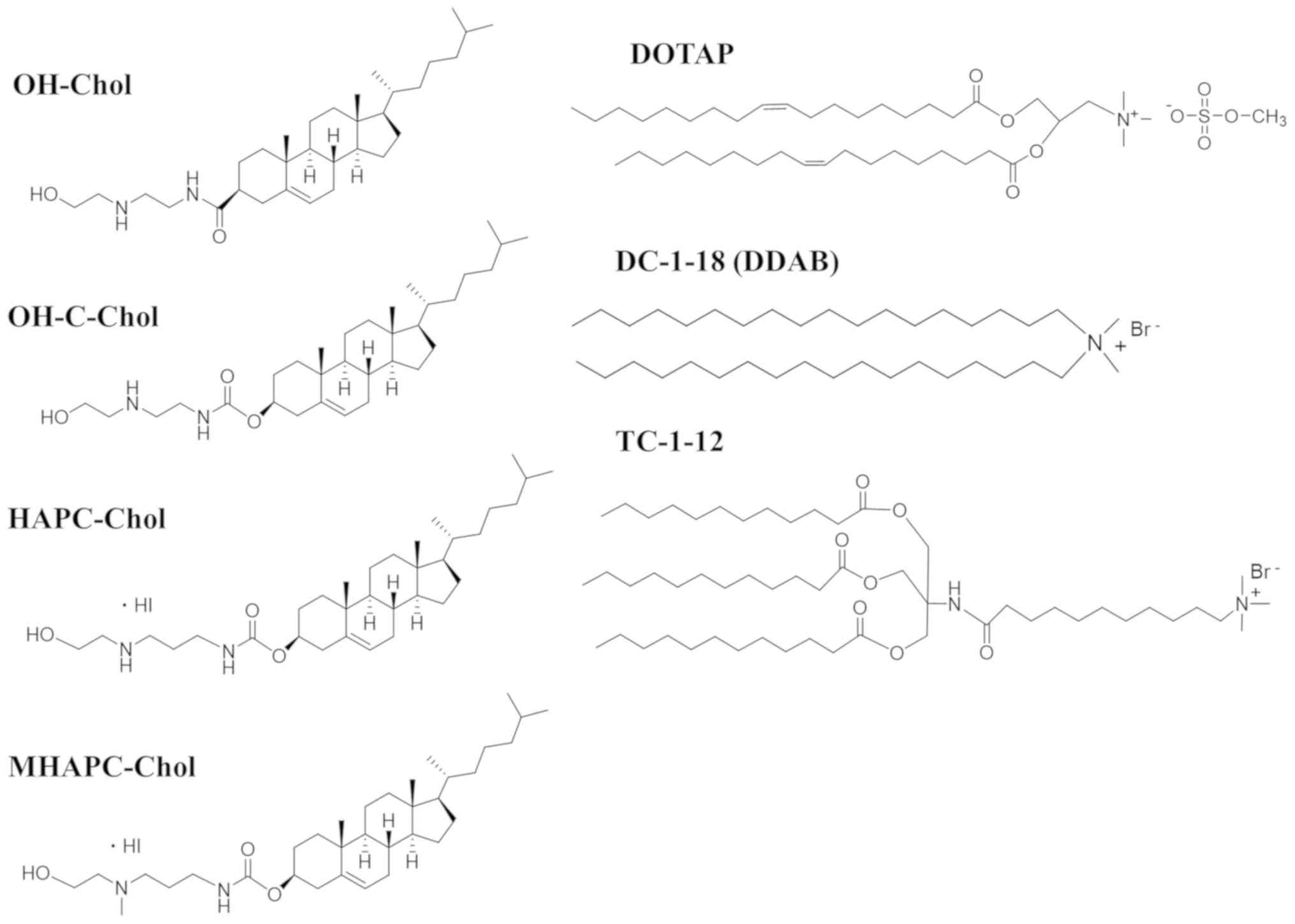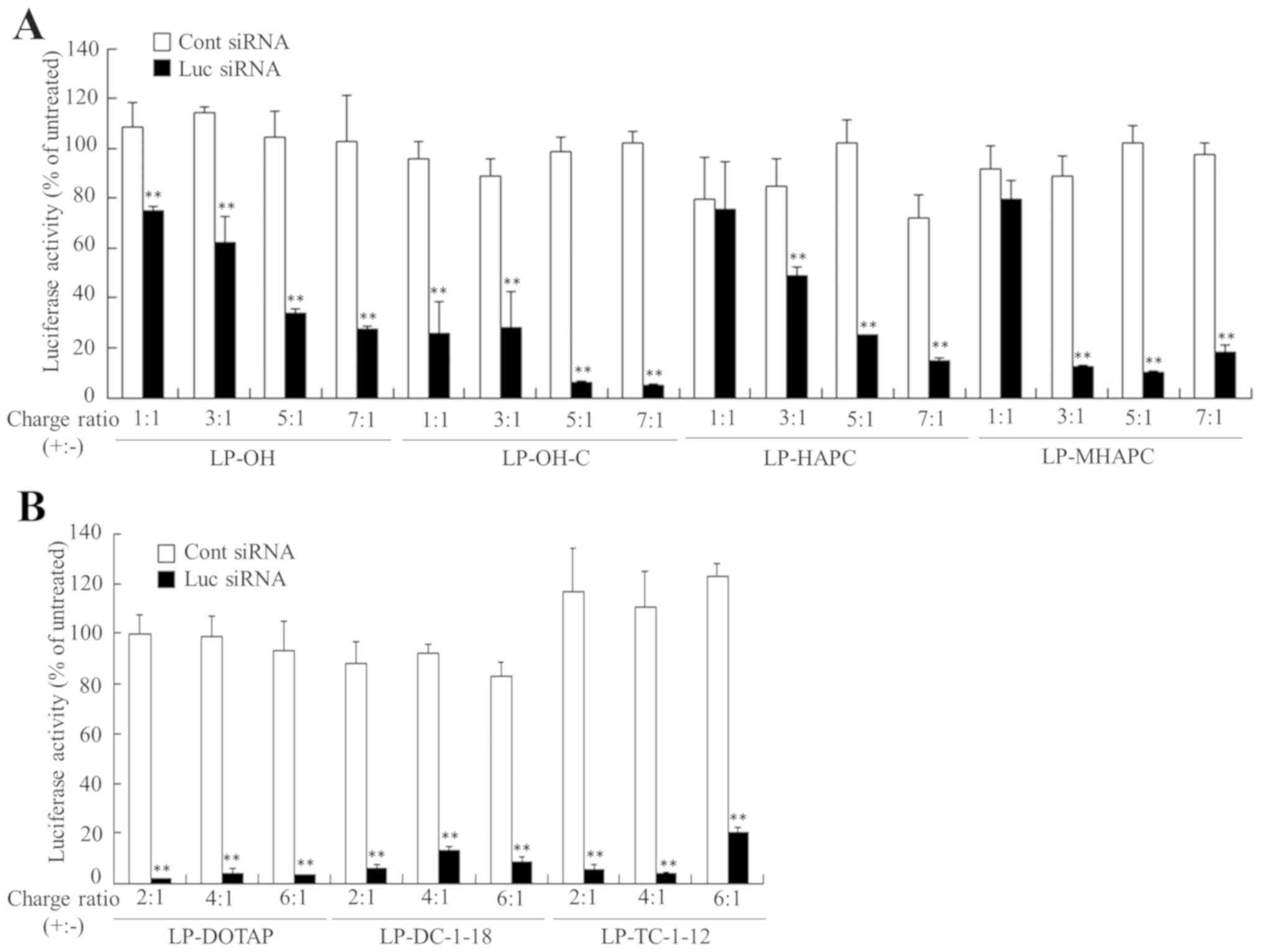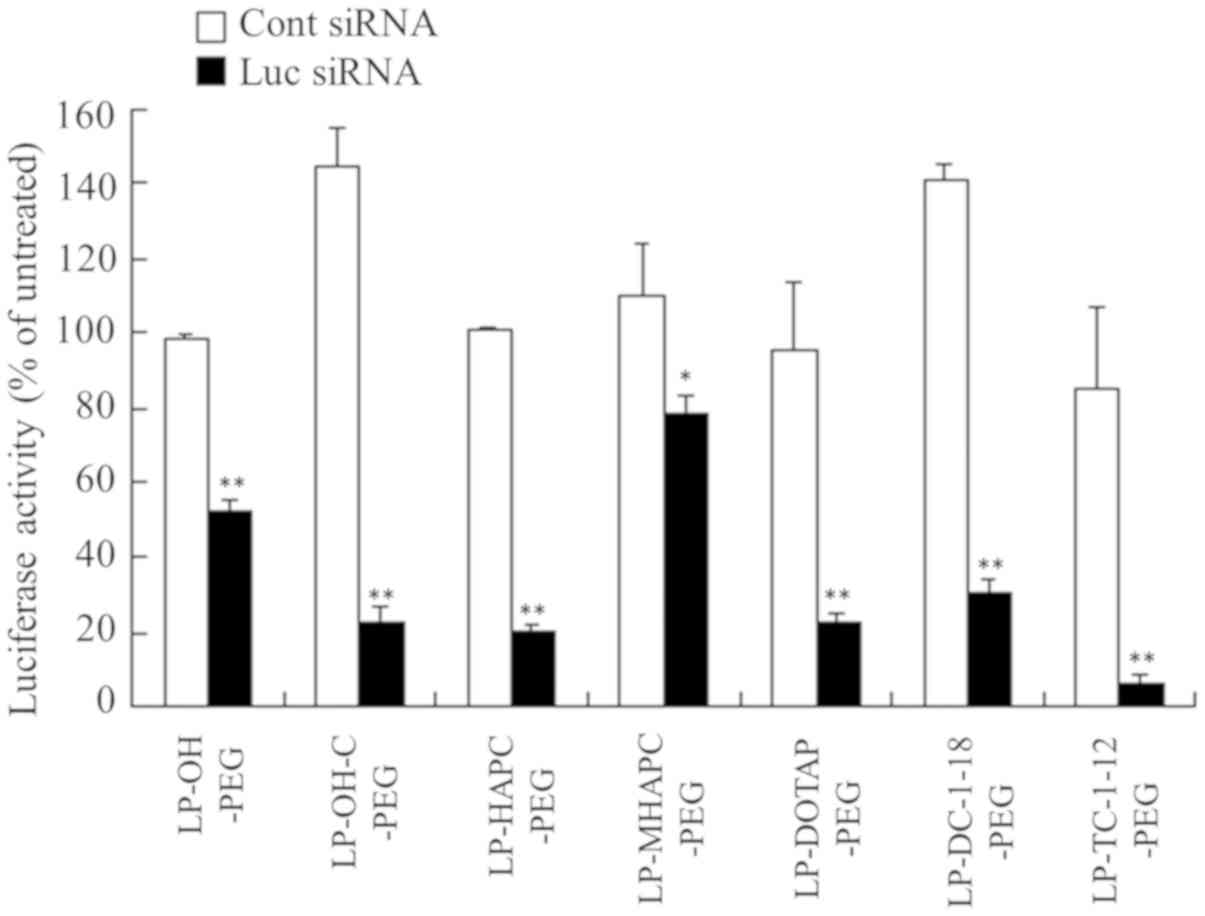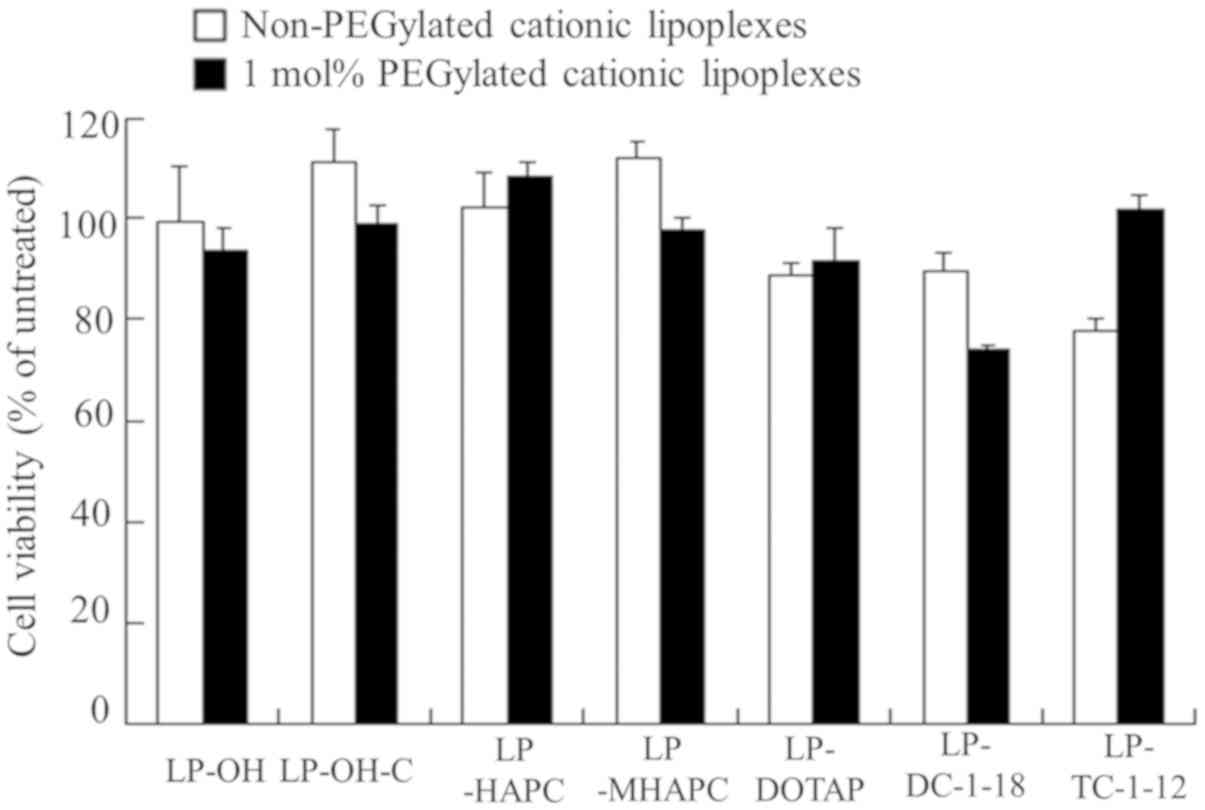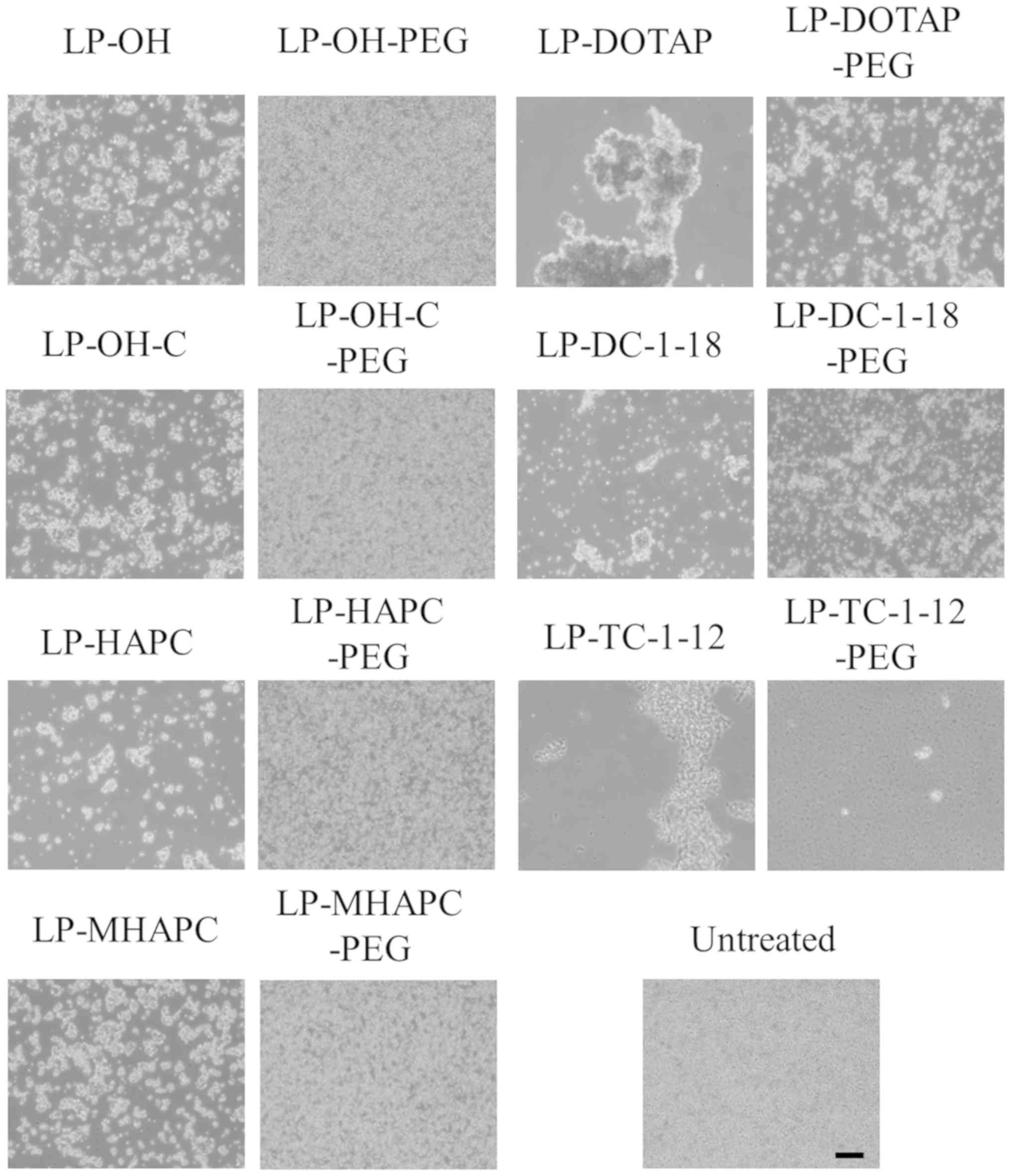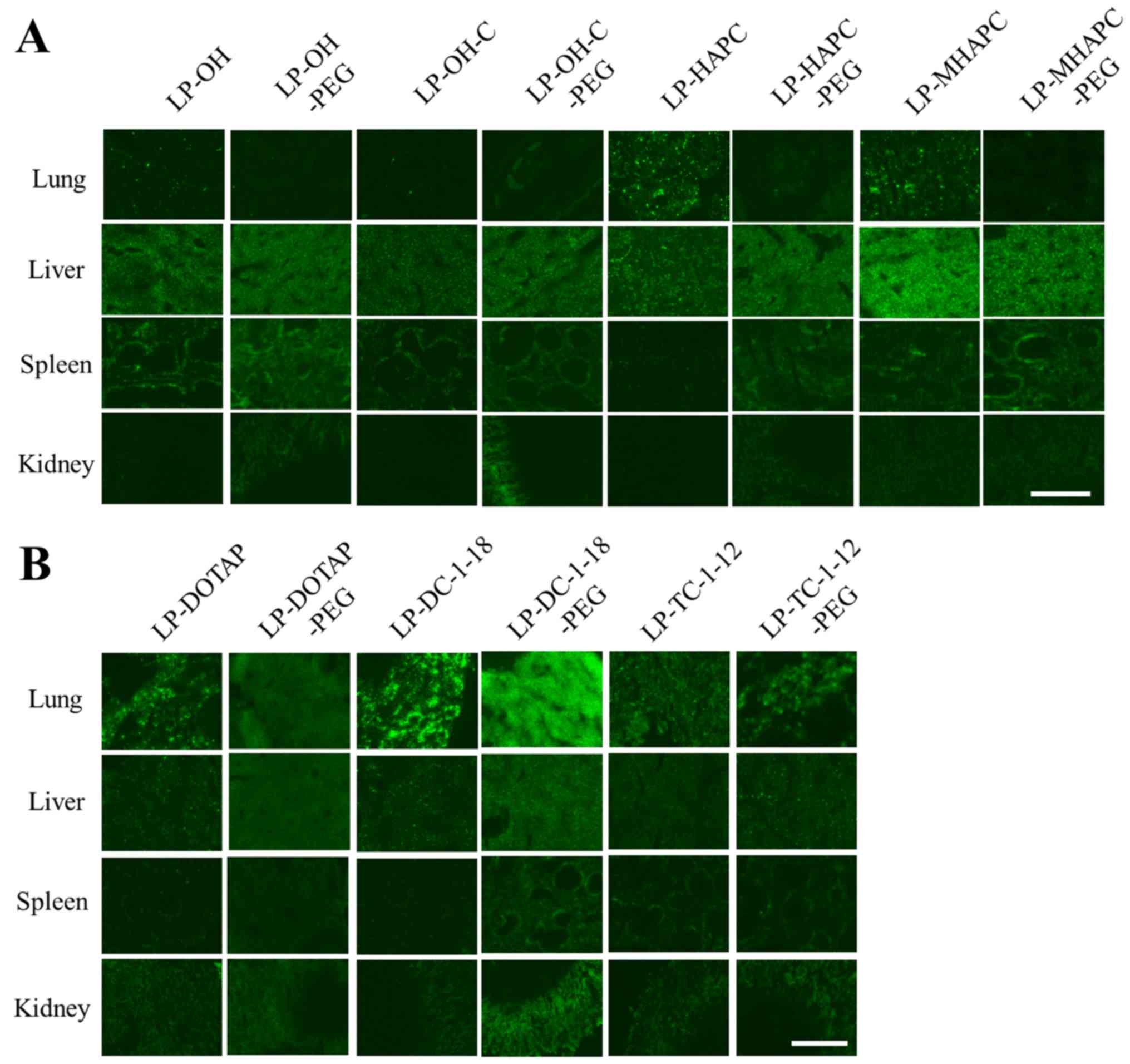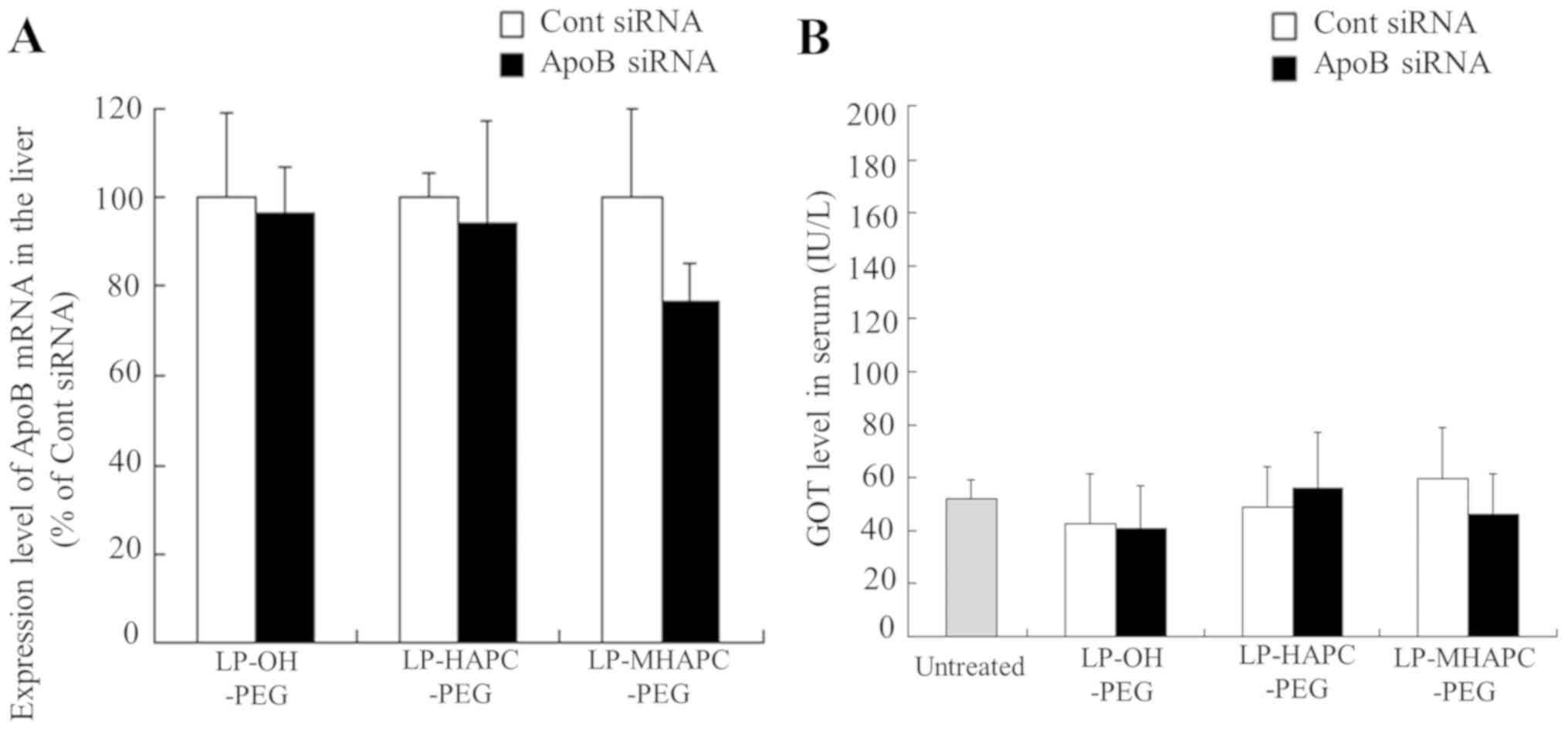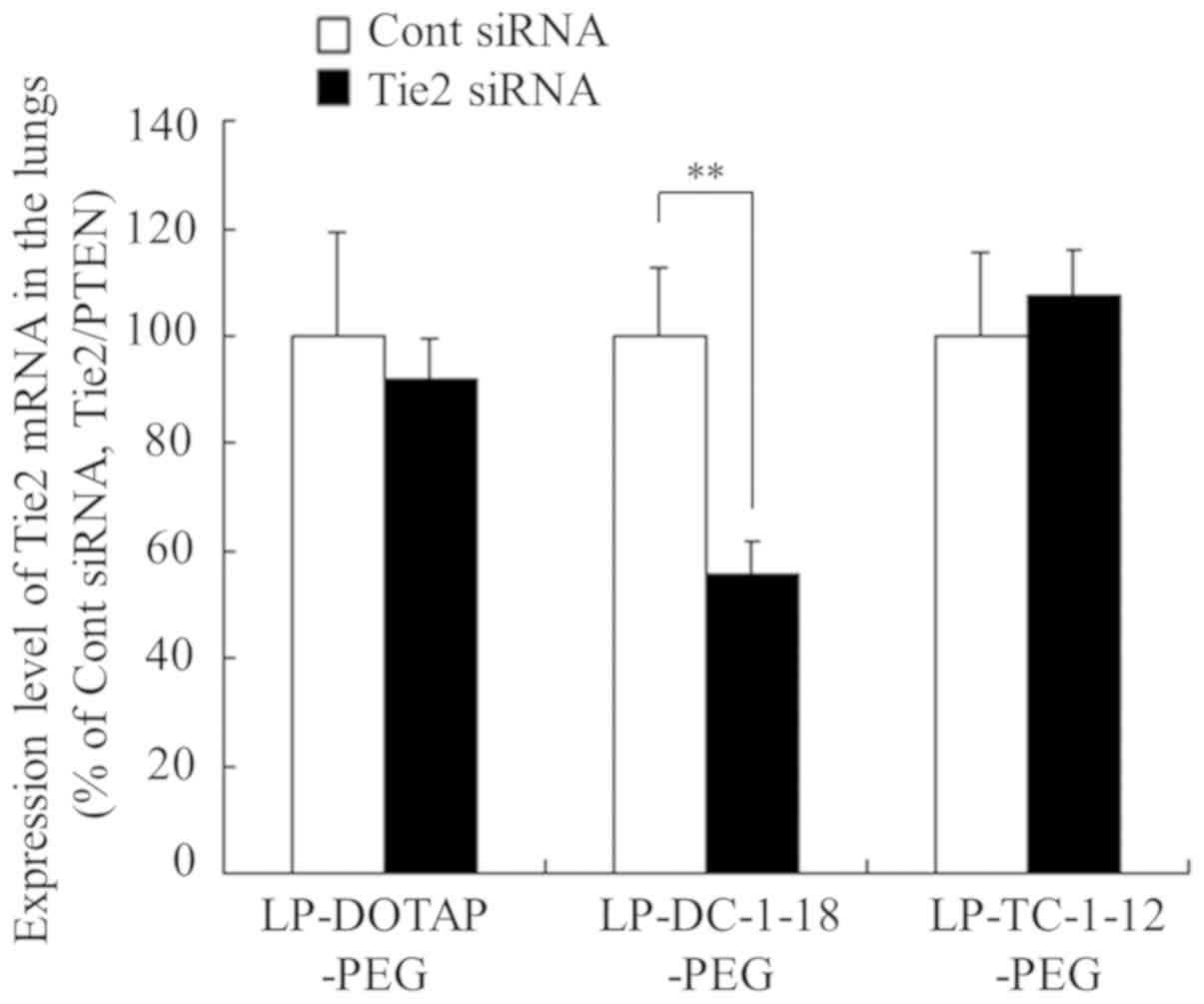|
1
|
Wilson RC and Doudna JA: Molecular
mechanisms of RNA interference. Annu Rev Biophys. 42:217–239.
2013.PubMed/NCBI View Article : Google Scholar
|
|
2
|
Bumcrot D, Manoharan M, Koteliansky V and
Sah DW: RNAi therapeutics: A potential new class of pharmaceutical
drugs. Nat Chem Biol. 2:711–719. 2006.PubMed/NCBI View Article : Google Scholar
|
|
3
|
Castanotto D and Rossi JJ: The promises
and pitfalls of RNA-interference-based therapeutics. Nature.
457:426–433. 2009.PubMed/NCBI View Article : Google Scholar
|
|
4
|
Hickerson RP, Vlassov AV, Wang Q, Leake D,
Ilves H, Gonzalez-Gonzalez E, Contag CH, Johnston BH and Kaspar RL:
Stability study of unmodified siRNA and relevance to clinical use.
Oligonucleotides. 18:345–354. 2008.PubMed/NCBI View Article : Google Scholar
|
|
5
|
Wang J, Lu Z, Wientjes MG and Au JL:
Delivery of siRNA therapeutics: Barriers and carriers. AAPS J.
12:492–503. 2010.PubMed/NCBI View Article : Google Scholar
|
|
6
|
Chen X, Mangala LS, Rodriguez-Aguayo C,
Kong X, Lopez-Berestein G and Sood AK: RNA interference-based
therapy and its delivery systems. Cancer Metastasis Rev.
37:107–124. 2018.PubMed/NCBI View Article : Google Scholar
|
|
7
|
de Fougerolles AR: Delivery vehicles for
small interfering RNA in vivo. Hum Gene Ther. 19:125–132.
2008.PubMed/NCBI View Article : Google Scholar
|
|
8
|
Zhang S, Zhi D and Huang L: Lipid-based
vectors for siRNA delivery. J Drug Target. 20:724–735.
2012.PubMed/NCBI View Article : Google Scholar
|
|
9
|
Zhang Y, Satterlee A and Huang L: In vivo
gene delivery by nonviral vectors: Overcoming hurdles? Mol Ther.
20:1298–1304. 2012.PubMed/NCBI View Article : Google Scholar
|
|
10
|
Xia Y, Tian J and Chen X: Effect of
surface properties on liposomal siRNA delivery. Biomaterials.
79:56–68. 2016.PubMed/NCBI View Article : Google Scholar
|
|
11
|
Hatakeyama H, Akita H and Harashima H: The
polyethyleneglycol dilemma: Advantage and disadvantage of
PEGylation of liposomes for systemic genes and nucleic acids
delivery to tumors. Biol Pharm Bull. 36:892–899. 2013.PubMed/NCBI View Article : Google Scholar
|
|
12
|
Lee J and Ahn HJ: PEGylated DC-Chol/DOPE
cationic liposomes containing KSP siRNA as a systemic siRNA
delivery Carrier for ovarian cancer therapy. Biochem Biophys Res
Commun. 503:1716–1722. 2018.PubMed/NCBI View Article : Google Scholar
|
|
13
|
Zhang Y, Li H, Sun J, Gao J, Liu W, Li B,
Guo Y and Chen J: DC-Chol/DOPE cationic liposomes: A comparative
study of the influence factors on plasmid pDNA and siRNA gene
delivery. Int J Pharm. 390:198–207. 2010.PubMed/NCBI View Article : Google Scholar
|
|
14
|
Hattori Y, Machida Y, Honda M, Takeuchi N,
Yoshiike Y, Ohno H and Onishi H: Small interfering RNA delivery
into the liver by cationic cholesterol derivative-based liposomes.
J Liposome Res. 27:264–273. 2017.PubMed/NCBI View Article : Google Scholar
|
|
15
|
Santel A, Aleku M, Keil O, Endruschat J,
Esche V, Fisch G, Dames S, Löffler K, Fechtner M, Arnold W, et al:
A novel siRNA-lipoplex technology for RNA interference in the mouse
vascular endothelium. Gene Ther. 13:1222–1234. 2006.PubMed/NCBI View Article : Google Scholar
|
|
16
|
Fehring V, Schaeper U, Ahrens K, Santel A,
Keil O, Eisermann M, Giese K and Kaufmann J: Delivery of
therapeutic siRNA to the lung endothelium via novel Lipoplex
formulation DACC. Mol Ther. 22:811–820. 2014.PubMed/NCBI View Article : Google Scholar
|
|
17
|
Hattori Y, Hara E, Shingu Y, Minamiguchi
D, Nakamura A, Arai S, Ohno H, Kawano K, Fujii N and Yonemochi E:
siRNA delivery into tumor cells by cationic cholesterol
derivative-based nanoparticles and liposomes. Biol Pharm Bull.
38:30–38. 2015.PubMed/NCBI View Article : Google Scholar
|
|
18
|
Ding W, Hattori Y, Higashiyama K and
Maitani Y: Hydroxyethylated cationic cholesterol derivatives in
liposome vectors promote gene expression in the lung. Int J Pharm.
354:196–203. 2008.PubMed/NCBI View Article : Google Scholar
|
|
19
|
Hattori Y, Nakamura T, Ohno H, Fujii N and
Maitani Y: siRNA delivery into tumor cells by lipid-based
nanoparticles composed of hydroxyethylated cholesteryl triamine.
Int J Pharm. 443:221–229. 2013.PubMed/NCBI View Article : Google Scholar
|
|
20
|
Hattori Y, Arai S, Kikuchi T, Ozaki KI,
Kawano K and Yonemochi E: Therapeutic effect for liver-metastasized
tumor by sequential intravenous injection of anionic polymer and
cationic lipoplex of siRNA. J Drug Target. 24:309–317.
2016.PubMed/NCBI View Article : Google Scholar
|
|
21
|
Hattori Y, Arai S, Okamoto R, Hamada M,
Kawano K and Yonemochi E: Sequential intravenous injection of
anionic polymer and cationic lipoplex of siRNA could effectively
deliver siRNA to the liver. Int J Pharm. 476:289–298.
2014.PubMed/NCBI View Article : Google Scholar
|
|
22
|
Aleku M, Schulz P, Keil O, Santel A,
Schaeper U, Dieckhoff B, Janke O, Endruschat J, Durieux B, Röder N,
et al: Atu027, a liposomal small interfering RNA formulation
targeting protein kinase N3, inhibits cancer progression. Cancer
Res. 68:9788–9798. 2008.PubMed/NCBI View Article : Google Scholar
|
|
23
|
Hattori Y, Nakamura A, Arai S, Kawano K,
Maitani Y and Yonemochi E: siRNA delivery to lung-metastasized
tumor by systemic injection with cationic liposomes. J Liposome
Res. 25:279–286. 2015.PubMed/NCBI View Article : Google Scholar
|
|
24
|
Livak KJ and Schmittgen TD: Analysis of
relative gene expression data using real-time quantitative PCR and
the 2(-ΔΔC(T)) method. Methods. 25:402–408. 2001.PubMed/NCBI View Article : Google Scholar
|
|
25
|
Hattori Y, Nakamura M, Takeuchi N, Tamaki
K, Shimizu S, Yoshiike Y, Taguchi M, Ohno H, Ozaki KI and Onishi H:
Effect of cationic lipid in cationic liposomes on siRNA delivery
into the lung by intravenous injection of cationic lipoplex. J Drug
Target. 27:217–227. 2019.PubMed/NCBI View Article : Google Scholar
|
|
26
|
Hattori Y, Takeuchi N, Nakamura M,
Yoshiike Y, Taguchi M, Ohno H, Ozaki K and Onishi H: Effect of
cationic lipid type in cationic liposomes for siRNA delivery into
the liver by sequential injection of chondroitin sulfate and
cationic lipoplex. J Drug Deliv Sci Technol. 48:235–244. 2018.
View Article : Google Scholar
|
|
27
|
Yoshikawa N, Fumoto S, Nakashima M,
Shimokawa K, Miyamoto H and Nishida K: The role of fibronectin in
pulmonary gene transfer following intravenous administration of
lipoplex in mice. Biol Pharm Bull. 36:1807–1813. 2013.PubMed/NCBI View Article : Google Scholar
|
|
28
|
Simberg D, Weisman S, Talmon Y, Faerman A,
Shoshani T and Barenholz Y: The role of organ vascularization and
lipoplex-serum initial contact in intravenous murine lipofection. J
Biol Chem. 278:39858–39865. 2003.PubMed/NCBI View Article : Google Scholar
|















